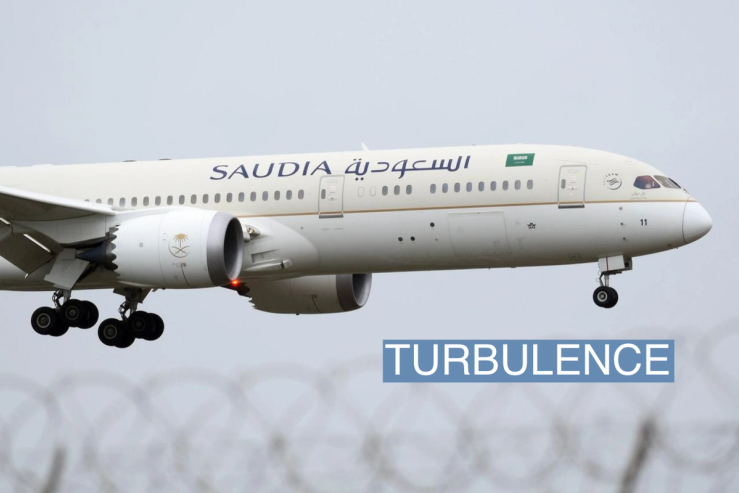The Scoop
Boeing’s $37 billion sale of commercial aircraft to Saudi Arabia last month was one of the largest civil aviation deals in history. But in October, it appeared close to unraveling.
That month, members of the OPEC+ oil cartel, led by the Saudis, announced cuts to crude production, infuriating a Biden White House that was worried about spiraling gas prices just weeks before midterm elections.
President Biden publicly threatened that Riyadh’s rulers would face “consequences” for allegedly siding with Russian President Vladimir Putin on energy prices, and Democratic lawmakers drafted legislation aimed at withdrawing U.S. military support for Saudi Arabia.
The Saudis weren’t pleased. According to two people briefed on the Boeing negotiations, Riyadh “paused” the talks with the aerospace giant in October to try and gauge if the Biden administration was serious about penalties.
“You’d think twice about spending billions of dollars on airplanes when the U.S. side was talking of sanctions,” said one of the people briefed on the talks. Sensing the friction, Boeing’s chief competitor for the Saudi business, Europe’s Airbus, made a sweetened counteroffer, according to a U.S. official involved in the negotiation. The official said the administration doubted this standoff was really a “make or break” moment for a years-long negotiation that was always expected to end this spring.
But senior U.S. and Saudi government officials ultimately became more directly involved in the commercial talks and brought them back on track, according to the people briefed. The Saudi ambassador to Washington, Princess Reema bint Bandar al Saud, played a particularly central role, as did the White House’s Middle East point man, Brett McGurk, and the State Department’s assistant secretary for energy resources, Amos Hochstein. (McGurk’s wife is an editor at Semafor; she was not involved in the reporting or editing of this story.)
Both the White House and Congress ultimately backed down on the talk of punishing the Saudis, and Biden heralded the Boeing deal last month as supporting 1 million American jobs across 44 U.S. states. “We can and will lead the world in manufacturing,” he tweeted.
A Boeing spokesman told Semafor: “Boeing has consistently supported global trade and appreciates the Biden Administration’s commercial advocacy overseas on behalf of American workers and industry.”
In this article:
Jay’s view
The Boeing deal’s last-minute turbulence highlights just how fraught the Biden administration’s relationship has become with Riyadh. The fact that high-level officials on both sides swooped in to save it shows how the desire of American companies to do business with the Saudis is part of the glue still holding the alliance together, and one of the factors that may limit the White House’s ability, or desire, to dial back its ties with the Kingdom.
Washington’s relationship with the Saudis has long been underpinned by an implicit trade: The U.S. provides security, while the Kingdom keeps the price of oil in check.
Relations have frayed in recent years, though, over Saudi Arabia’s human rights record, energy prices, and Iran, among other issues. U.S. intelligence agencies believe Mohammed Bin Salman — the kingdom’s young, de facto leader — ordered the murder of Saudi dissident and Washington Post columnist Jamal Khashoggi in 2018, a charge the crown prince denies. Biden pledged in the 2020 campaign to make Saudi Arabia and Bin Salman pariahs on the global stage.
Bin Salman has also begun to pursue a Saudi First foreign policy doctrine that often places it on opposite sides from the U.S., and not just on energy policy. Last month, Riyadh turned to China to broker a normalization of ties with Iran after years of criticizing the U.S. for its attempts at nuclear diplomacy with Tehran. Riyadh also recently joined the Beijing-led security and economic bloc, the Shanghai Cooperation Organization, which is a key Chinese lever to exert its global influence.
Still, amidst the tension, there have been examples of cooperation — the Boeing deal key among them.
U.S. officials told Semafor that the finalization of the sale last month was a critical win for U.S. manufacturing and provides American companies a major stake in Bin Salman’s economic modernization program, called Vision 2030. The Saudi government has committed to spending over a $1 trillion over the next decade to reorient the country away from a dependence on fossil fuels.
The Biden administration’s collaboration with Riyadh on security issues has also advanced in recent months, said U.S. officials. The White House lauded Saudi Arabia’s February pledge of $400 million in energy assistance to Ukraine. They also commended Riyadh for abiding by a U.S.- and U.N.-brokered cease-fire in Yemen.
“The Saudis have done a lot in Yemen over recent months to set conditions for ending the war,” said a senior U.S. official, noting there hasn’t been a Saudi airstrike in Yemen, or a cross border attack from Yemen, in over one year.
The senior U.S. official said relations with Riyadh have also benefited from joint actions against Iran. They specifically cited a coordinated November move to publicly warn that Tehran was preparing to launch missile strikes on the kingdom, as a means to deflect from the growing anti-regime protests inside Iran. The U.S. eventually scrambled jets in the Persian Gulf as a means to deter Tehran. “The attack likely would have happened if we didn’t do this,” the official said.
The View From Saudi Arabia
Saudi officials said the Boeing deal symbolizes the importance they place on the kingdom’s partnership with the U.S. And they noted that they value U.S. commercial and defense technologies as the best in the world. “American companies have always played a critical role in our economy, and this deal with @Boeing demonstrates our partnership in action,” Princess Reema said after the deal’s announcement.
But Saudi analysts also said that the U.S.’s signaling that it’s seeking to reorient its defense posture towards Asia, and away from the Mideast, is forcing the kingdom to look for other allies to guarantee Riyadh’s security, such as China. Beijing, they note, is looking for openings to expand its influence in the region.
“China today is utilizing a vacuum that it sees as left by the United States,” said Mohammed Alyahya, a senior Saudi fellow at Harvard’s Belfer Center.
Notable
- Boeing’s commercial ties to Saudi Arabia go back nearly 80 years, beginning with President Roosevelt’s gift of a DC-3 Dakota airplane — made by the heritage company, Douglas Aircraft – to King Abdulaziz al Saud in 1945.
- Saudi officials are expected to visit Yemen’s capital, Sanaa, this week to try and forge a permanent ceasefire with Iranian-backed Houthi rebels.
- Saudi Arabia’s and Iran’s foreign ministers met in Beijing last Thursday to move forward with normalizing relations, including the re-opening of embassies and cooperation on security and economic issues.


